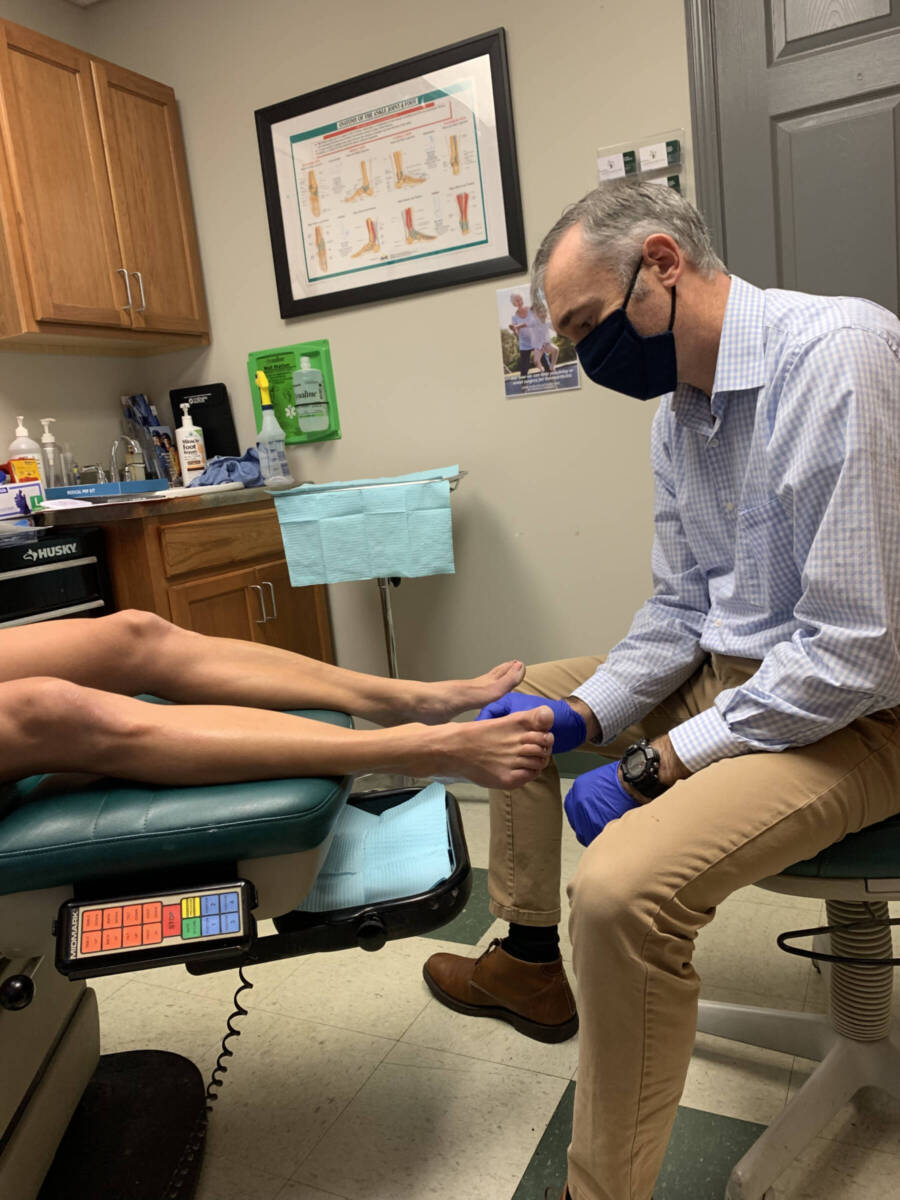Should Runners Take Creatine? (Expert Take)
The main benefit of creatine for runners is in enhancing recovery, not performance in long-distance running, says Laura Norris, running coach with a master’s degree in applied exercise science. As Norris explains, “The creatine-phosphate system is not used in middle or long-distance running, as these events rely more on glycolysis and oxidative metabolism.” Read on to learn more about how to use creatine to enhance your run training.

One of the most studied dietary supplements for athletes is creatine. But when many of us think of creatine, we think of bodybuilders. Actually, we all have creatine as it is a naturally occurring compound–an amino acid located mostly in our skeletal muscles where it’s used for energy and our brain. Our liver, pancreas, and kidneys naturally make about 1 gram of creatine a day. Additionally, we get creatine in our diet in foods like red meat and seafood.
But is creatine for runners? Should runners take creatine? Creatine supplements caught my eye when I saw many Instagram influencers I follow sharing that they take creatine after running for recovery. Then, on a couple of my runs, some of my running friends noted that they will take creatine before running as part of their pre-workout routine.
Jump Ahead:
- What is creatine?
- Is creatine a protein?
- What does creatine do?
- What are the benefits of taking creatine?
- Is creatine recommended for runners?
- Does creatine help running endurance?
- Do marathon runners use creatine?
- Who should take creatine?
- How should you take creatine?
- What are cons of creatine for runners?
- Which creatine is best for runners?
- 5 Best Creatine Supplements for Runners
- Tips for Taking Creatine for Runners
I started to wonder if I should take creatine, too? After all, isn’t that how many of us start taking supplements—we hear that our friends are taking something, seeing potential benefits, and wonder if we should do the same.
But before I jumped on the creatine bandwagon, I wanted to do my research on creatine and running. I’m glad I did. I learned creatine and running aren’t always a match made in heaven. But for me, as a master’s runner, there are a lot of benefits for taking 5mg of creatine a day so I started doing so about two months ago and have felt stronger on my runs. Below I share tips from registered dietitians and experts on when and how runners should take creatine.
Is creatine good for runners?
Creatine supplementation is not necessary for recreational runners unless they are lifting weights, doing sprints, in a high-training load, or are a master’s athlete.
The main benefit for most long distance runners in supplementing with creatine comes in reducing recovery time — not enhancing performance in long-distance running (or really reps longer than short sprints of around 20 seconds). As Norris explains, “The creatine-phosphate system is not used in middle or long-distance running, as these events rely more on glycolysis and oxidative metabolism.”
However, runners who are in a high training load, such as in the peak phase of a marathon cycle, may find benefits from regularly supplementing with creatine after their workouts to spur recovery, as there is evidence that creatine enhances recovery and glycogen synthesis. This is especially true if you are also lifting weights several times a week during this period.
With this in mind, if you’re able to recover faster and thus train harder, then your performance may improve—as an indirect correlation to creatine supplementation.
Megan Robinson, registered sports dietitian, recommends taking creatine to her masters’ runners—particularly those over 50. Scientific research indicates that creatine is an effective supplement in increasing aging muscle mass and strength, possibly by influencing high-energy phosphate metabolism, muscle protein kinetics and growth factors, and bone mineral enhancement.
Who should take creatine?
- Runner who strength trains multiple times a week
- Sprinter
- Person who performs HIIT exercises
- Runner in the midst of a hard training cycle (such as a marathoner)
- Master’s runner
- A runner who is injured needing to maintain muscle mass due to inactivity or immobility
- A marathoner or ultra-runner who is carb loading as creatine helps you retain fluid and carbs
The benefits of creatine for runners
Does creatine benefit runners? Below are the purported upsides of taking creatine for running.
- Improved strength, muscle mass, and performance. Taking creatine before a workout may allow a person to do more reps or sprints which will then to lead to great strength, muscle mass or performance.
- Faster recovery. Creatine can also enhance recovery, allowing an athlete to continue to work out—particularly high intensity training like sprint interval training or weight lifting. It can also help with glycogen replenishment which spurs recovery.
- Injury prevention. Some evidence shows that taking creatine may help prevent bone and soft tissue injuries and reduce the risk of cramping by improving hydration.
- Better cognition. Studies show that creatine may improve cognition in older adults during times of hard thinking.
- Stronger bones in older adults. Using creatine supplements may help masters’ runners fight age-related bone density decline.
- Reduce sagging skin. Some research indicates that creatine may help fight “runner’s fact” in that a cream with creatine can decrease sagging skin, wrinkles, and even sun damage.
What are cons of creatine for runners?
The potential side effects of creatine could include (especially if you have too much creatine):
- Bloating
- Water retention
- Water weight gain
- GI issues
5 best creatine for runners
I asked David Block, CEO of Previnex (the supplement company I turn to quality, effective supplements with a moneyback guarantee) on how to choose the best creatine supplement. (After this article originally published, Previnex released their own creatine powder called Muscle Health PLUS).
Block advises consumers to look for supplements that:
- use the form of creatine HCL or creatine monohydrate
- perform reputable third-party testing
- display quality sourcing, and
- use high-quality production with quality control
With that in mind, here are trusted brands of creatine supplements to consider if you would like to supplement with creatine.
- Previnex Muscle Health
- Promera Creatine
- Momentous Creatine (this is what I take)
- Legion Creatine
- Thorne Creatine
Tips for creatine and running
Enhance recovery
To enhance recovery, take about 5 grams of creatine 30-90 minutes after your run. Do this consistently.
Enhance performance
If you want to enhance performance, take 5 grams of creatine 30-90 minutes before your run. Performance-enhancing potential for creatine supplementation is not contingent on loading, so no need to do this before every workout for it to work.
Test it out — especially before race day
Test out creatine supplementation before taking it before important workouts or races, especially if you plan to use creatine before running.
Be conscious of intake
Do not take more than the prescribed amount. There is no benefit to taking more creatine and could negatively impact your GI system.
Avoid bloating
If you are worried about bloating, half your creatine dosage. I take 5 mg and did not experience bloating.
Maximize use for high training loads
Consider taking creatine regularly during high training loads like in the peak phase of a marathon cycle.
Use it to maintain muscle mass
Consider taking creatine if you are injured or a master’s athlete to maintain muscle mass.
I am not a registered dietitian or doctor, but I did speak with experts in nutrition to write this article. Always speak to your doctor before buying and trying a supplement!
FAQs about Creatine & Running
Creatine + endurance running: A match made in heaven?
No, there is not overwhelming evidence creatine can improve running endurance. This is because long-distance running does not use the ATP-Pcr system much, notes Norris. For anaerobic exercise (without oxygen), creatine plays a starring role in producing energy in the form of ATP (or adenosine triphosphate), energy-carrying molecules found in the cells of all living things.
In anaerobic exercise, like shorts sprints and lifting weights, ATP is made from the energy-releasing breakdown of phosphocreatine in the muscle cells. In aerobic exercise, the body uses oxygen to break down the glucose (carbs) for ATP.
Most of our running uses the aerobic system. Short sprints of 20 seconds use primarily the anaerobic system and would benefit from creatine use.
Should marathon runners use creatine?
Marathon runners (and long-distance runners in general) can use creatine to help with recovery, but not with exercise performance. Creatine is helpful for sprint performance, but research does not indicate that creatine is helpful for long-distance events like the marathon.
Many marathon runners and endurance athletes will take creatine after their runs to help mitigate muscle damage and speed-up recovery by helping with the replenishment of glycogen storage.
There is some evidence that creatine may be able to have positive effects with endurance performance in racing. It could help with mid-race surges and finishing kicks towards the finish line by increasing energy levels. Research studies show the popular supplement could enhance energy-availability in the oft-not discussed third energy system—the phosphagen system. However, this research is small and preliminary.
Should you take creatine before or after running?
Many wonder: “When should I take creatine?”
The answer is it depends.
- To improve muscle recovery: After. For recovery goals, the best time to take it is about a half hour within finishing a run. Runners should take about 3-5 grams of creatine, or 0.3g per kilogram of body weight a day, according to the International Society of Sports Nutrition. (A kilogram is 2.2 pounds).
- To improve your performance: Before. If you are wanting to boost your output, take 3-5 grams of creatine about 30 minutes before exercise.
If you want guidance with your run training, check out my run coaching services. Do you take creatine?






